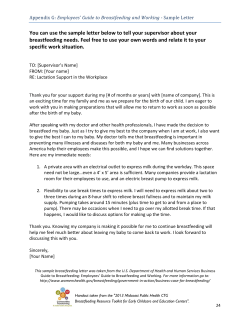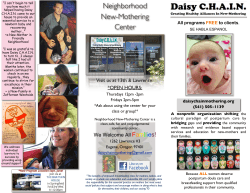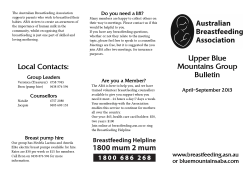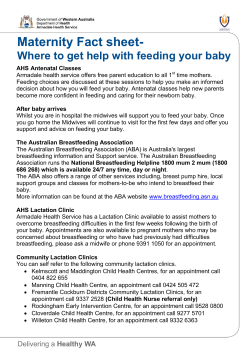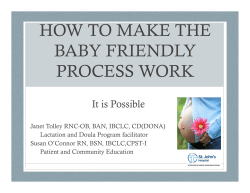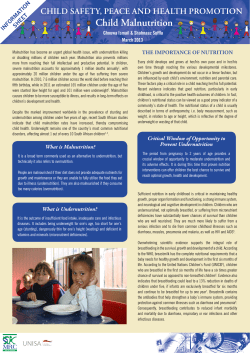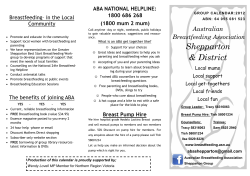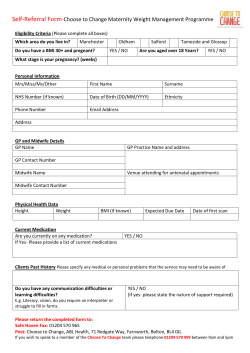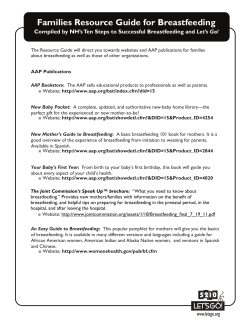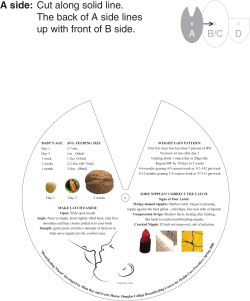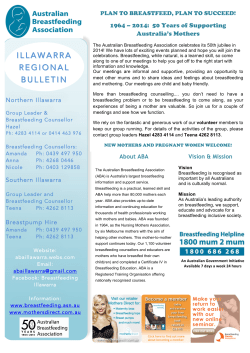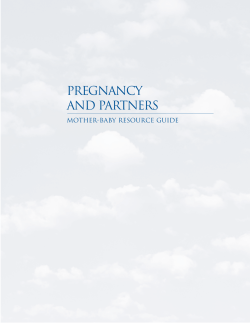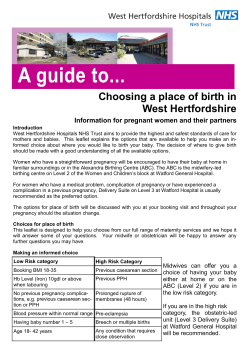
Having a baby at South Gippsland Hospital Information about
Information about Having a baby at South Gippsland Hospital www.southgippslandhospital.org.au Phone Contacts Ambulance 000 South Gippsland Hospital 56839777 Foster Medical Centre 56822088 Toora Medical Centre 56862203 Australian Breastfeeding Association (ABA) Counsellor 1800MUM2MUM Maternal and Child Health 24 hour help line 132229 Maternal and Child Health Centre Foster 56822241 Maternal and Child Health Centre Leongatha 56620853 Maternal and Child Health Centre Yarram 51820258 Welcome Dear Future Parents The staff of South Gippsland Hospital would like to express our best wishes to you on the coming birth of your baby. We are here to guide and assist you through your pregnancy and the birth of your baby and beyond. If you have any questions or concerns, please do not hesitate to contact your doctor or the midwives at the hospital. All the best Midwifery Team South Gippsland Hospital What service does SGH Maternity provide? Clinic based antenatal care that is shared between midwives and GP obstetricians during your pregnancy Antenatal Education Program Support and assistance during labour and birthing. Early parenting advice such as settling the newborn, nappy changing, bathing and infant feeding Home (domiciliary) visits and telephone support after discharge Referral service to other agencies Lactation support More about the clinic The Clinic operates two days each week with appointment times in the morning and home visits in the afternoon. Midwives Clinic at Foster Medical Centre Monday – 9.00am – 12.30pm Thursday – 9.00am -12.30pm Please make appointments via Foster Medical Centre on 5682 2088. Antenatal Clinic Schedule This may alter according to your needs Recommended Visiting Care Provider 12 weeks for first time mothers Midwife 16 weeks Midwife 20 weeks Doctor 24 weeks Midwife ½ hour 28 weeks Doctor 31 weeks Midwife 1 hour appointment 34 weeks Doctor 36 weeks Doctor 37 weeks Midwife ½ hour 38 weeks Midwife ½ hour 39, 40 & 40+ weeks Doctor appointment Antenatal Education Schedule An education program that provides a focus on labour, birth and parenting. The program will be a one-day workshop. A separate physiotherapy session is offered as part of antenatal education. Programs are offered in February, May, August and November. See our website for dates - www.southgippslandhospital.org.au. During your pregnancy Unexpected complications Please contact the hospital on 5683 9777 immediately if you experience any of the following during your pregnancy. Please ask for the midwife on duty. They can be a sign that further investigation is required: • Bleeding from the vagina (however small) • Severe or persistent vomiting and/or abdominal pain • Sudden puffiness, swelling of face, hands or feet • Severe headache or difficulties with vision or flashes of light • Pain or burning when passing urine • Irritating vaginal discharge or genital sores • Persistent low backaches, contractions, cramps, pelvic pressure, rupture of the membranes possibly indicating the onset of premature labour (before 37 weeks) What to bring to hospital It is best to have your bag ready for hospital so that when the first contraction comes, you do not have to spend valuable time packing. Here is a handy list to go by: sleep wear/track suit (at least 2 sets) dressing gown slippers maternity bras (at least 2) breast pads underpants (preferably old) sanitary pads (regular, not deodorised) bike pants to provide support for pelvic area toiletries camera and batteries high-energy snacks hair dryer (optional) pen watch/small clock iPod/music choices Items that assist with relaxation, eg oils, stress balls Items to pack for your baby Please feel free to provide your own clothes. We ask you to be responsible for the laundering of these. All baby clothing and nappies are supplied in hospital, however a set of clothes, including a nappy, is required on discharge. If you wish to use disposable nappies, please bring your own. You will need at least 8 nappies per day. A baby blanket for home When to come to hospital You are welcome to ring the hospital and speak to a midwife 24 hours a day to discuss the progress of your labour or to have any questions answered. You should come to hospital: • When you are having regular painful contractions, 5 – 10 minutes apart • When your waters break or you think they have • If you have any bleeding from the vagina Before you leave home, if possible ring the hospital to let us know you are coming. By ringing, you may save an unnecessary trip and also allow the midwives to prepare for your arrival. If you are already booked for a caesarean birth, please ring as soon as contractions commence and make your way to hospital. Accommodation for you and your baby Our maternity unit is incorporated into our general Acute ward. Television and bedside phones are provided. Rooming-in is encouraged in our midwifery unit. This means that the baby will stay by your bedside all or most of the time. This gives you the opportunity to learn about your baby’s behaviour and how to care for your baby. It also significantly decreases the risk of infection transmission. Fathers sleeping over Our policy will be shared with you during your clinic visits. Fathers are welcome to stay over (on a roll-out bed). We would ask for your consideration during busy times. Length of stay in hospital This is individual and related to your health, your baby’s progress and infant feeding establishment. As a rough guide: normal vaginal birth 3- 4 days and caesarean birth 5-7 days. You will be referred to domiciliary midwives and the Maternal and Child Health Service on discharge. Discharge planning may also involve other service providers such as post-acute care. Telephone calls Women are able to receive calls on individual bedside phones. The number of your phone will be given to you on admission. Birth plans A birth plan is your wish list for labour, so gather your thoughts and make your choice in preparation for the big day. It gives you the chance to think about the sort of birth you want. It prompts you, your partner, midwife or doctor to talk about the birth. Who do you want to be present at the birth? Your partner, a close friend, a sister or whomever you feel comfortable with. Do you want soft lighting, music, massage or other natural remedies? What sort of pain relief do you want, if any? Think about this carefully as your judgment can be clouded during labour. You may wish to document your ideas or just have a clear idea in your mind. It is important to be flexible in the way you write things because some options may be taken literally. Part of your birth plan may include considering any unexpected events/ changes that may arise in your labour. Support persons We welcome your support team to our hospital. This is a personal choice and can vary according to what will suit you during your experience. Ensure your support person is aware of your preferences and can assist you. Breastfeeding Breastfeeding is the ideal way to continue the close relationship you have formed during the pregnancy. Exclusively breastfeeding your baby for the first six months is best for your baby with the introduction of solids at this time and continuing to breastfeed for two years and beyond (World Health Organisation recommendations). There are many advantages of breastfeeding, including: • time saving • nutritionally correct • economical • digestible • convenient • right temperature • emotionally satisfying • increased contact and bonding protects against illness Short and long term health benefits • helps prevent allergies Therefore, the risks of not breastfeeding are as follows: • increased incidence of allergies increased incidence of gastrointestinal disturbances Increased incidence of heart disease later in life Increased risk to mother of breast and ovarian cancer. For information and evidence please see the World Health Organisation or Australian Breastfeeding Association websites. The World Health Organisations’ Ten Steps to Successful Breastfeeding (2007) are as follows. Whilst SGH is not yet Baby Friendly Hospital Initiative accredited, we strive to align with the following principles: Every facility providing maternity services and care for newborn infants should: 1. Have a written breast-feeding policy that is routinely communicated to all health care staff. 2. Train all health care staff in skills necessary to implement this policy. 3. Inform all pregnant women about the benefits and management of breastfeeding. 4. Encourage skin to skin contact and help mothers initiate breastfeeding within an hour of birth. 5. Show mothers how to breastfeed and maintain lactation even if they should be separated from their infant. 6. Give newborn infants of breastfeeding mothers no food or drink other than breast milk unless medically indicated. 7. Practice rooming-in – allow mothers and infants to remain together 24 hours per day. 8. Encourage breastfeeding on demand. 9. Give no artificial teats or pacifier dummies to breastfeeding infants. 10. Foster the establishment of breastfeeding support groups and refer mothers to them on discharge from hospital. Preparing for breastfeeding You may consider the following: • Asking your clinic midwife for information at any of your antenatal visits • Attending antenatal education sessions • Researching the topic at www.breastfeeding.asn.au Contacting the local ABA (Australian Breastfeeding Association) member – see the website for details Formula feeding The midwifery unit only supplies breast milk substitute (formula) for medical emergencies. Please bring in the type of breast milk substitute you plan to use. This will ensure that your baby can start feeding on your choice of formula as soon after birth as possible. If you choose to feed your baby formula it is important you leave hospital feeling confident with this process. If you have any allergies or family history you may choose to investigate different options of formula available. You will be given 1:1 education on formula feeding in hospital by the midwife on duty. It is important to know correct technique and sterilisation principles prior to discharge. If you choose to bottle feed the following is required while in hospital: Breast milk substitute of your choice suitable for a newborn Bottles Teats Bottle brush Plastic container to hold your bottles and equipment Sterilisation system of your choice so you can learn the process of safe formula feeding In hospital The midwives will assist you and your baby to learn how to breastfeed. In addition to individualised care and attention, we have DVDs and written information about breast feeding to assist you. At home The midwives will visit you once and then telephone to check how you are managing at home. The Maternal and Child health nurse will assist you with breastfeeding and help you as baby grows. The Australian Breastfeeding Association has regular meetings you can attend to meet with other mothers who are breastfeeding. ABA has a 24 hour Help Line for breastfeeding queries - 1800 mum 2 mum (1800 686 268). ABA members meet regularly to discuss parenting and feeding topics. Learn more about ABA at www.breastfeeding.asn.au Hospital visiting hours 9.00am – 12.00 noon and 2.00pm to 8.00pm. Rest period is encouraged between 12.00noon and 2.00pm. Your notes _____________________________________________________________ _____________________________________________________________ _____________________________________________________________ _____________________________________________________________ _____________________________________________________________ 87 Station Road (PO Box 104) FOSTER 3960 Phone: 03 5683 9777 Fax: 03 5682 2178 www.southgippslandhospital.org.au Version: 1 - Apr 2012
© Copyright 2025
